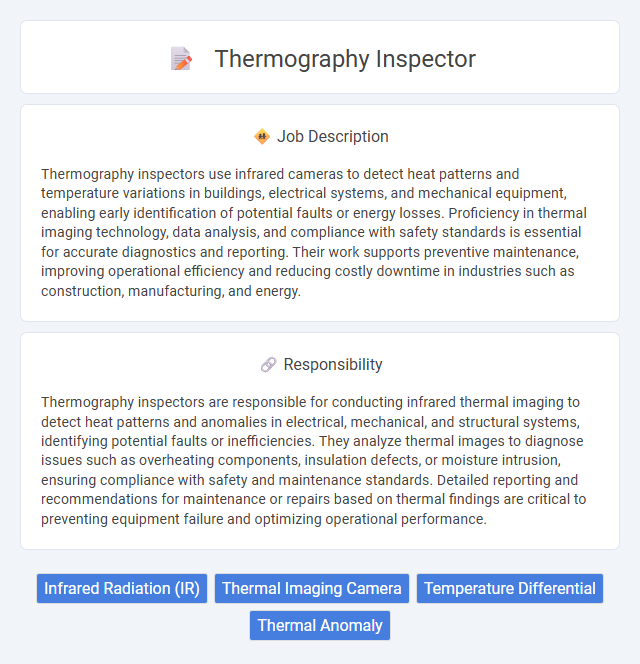
Thermography inspectors use infrared cameras to detect heat patterns and temperature variations in buildings, electrical systems, and mechanical equipment, enabling early identification of potential faults or energy losses. Proficiency in thermal imaging technology, data analysis, and compliance with safety standards is essential for accurate diagnostics and reporting. Their work supports preventive maintenance, improving operational efficiency and reducing costly downtime in industries such as construction, manufacturing, and energy.
Individuals with keen attention to detail and strong analytical skills are likely well-suited for a thermography inspector role, as the job involves interpreting thermal images to detect equipment anomalies. Those who prefer working in dynamic environments and have a background or interest in electrical, mechanical, or building systems may find greater compatibility with this position. People who can handle occasional physical activity and adapt to varied work locations may also have a higher probability of success in this career.
Qualification
Thermography inspectors must possess certification in infrared thermal analysis, often obtained through organizations like the Infrared Training Center (ITC) or the American Society for Nondestructive Testing (ASNT). A strong understanding of thermal imaging technology, electrical systems, building diagnostics, and safety standards is essential for accurate interpretation and reporting. Experience in industrial environments or construction, combined with knowledge of relevant software tools for image analysis, significantly enhances job performance and credibility.
Responsibility
Thermography inspectors are responsible for conducting infrared thermal imaging to detect heat patterns and anomalies in electrical, mechanical, and structural systems, identifying potential faults or inefficiencies. They analyze thermal images to diagnose issues such as overheating components, insulation defects, or moisture intrusion, ensuring compliance with safety and maintenance standards. Detailed reporting and recommendations for maintenance or repairs based on thermal findings are critical to preventing equipment failure and optimizing operational performance.
Benefit
Thermography inspectors likely provide significant benefits by detecting hidden issues such as electrical faults, insulation failures, and moisture intrusion, potentially preventing costly repairs. Their work might enhance safety by identifying overheating components before they cause fires or equipment failure. Employing thermography technology probably improves maintenance efficiency and extends the lifespan of critical systems.
Challenge
Thermography inspectors likely face challenges in accurately interpreting thermal images under varying environmental conditions, which can affect the reliability of their assessments. The probability of encountering complex equipment requiring specialized knowledge increases the demand for continuous learning and skill enhancement. They may frequently need to balance precision with efficiency while identifying potential issues before they escalate.
Career Advancement
Thermography inspectors skilled in infrared imaging and thermal analysis can advance to senior roles such as Lead Thermographer or Thermal Imaging Specialist, where they oversee complex inspections and mentor junior staff. Expertise in industry standards like ISO 18436-7 enhances credibility and opens opportunities in sectors including aerospace, manufacturing, and energy. Continuous training in cutting-edge thermographic technologies and certifications boosts career growth and earning potential.
Key Terms
Infrared Radiation (IR)
Thermography inspectors utilize Infrared Radiation (IR) technology to detect temperature variations on surfaces, identifying potential issues such as electrical faults, insulation defects, and mechanical failures. By analyzing IR images, they provide accurate assessments that prevent equipment downtime and enhance safety protocols. Their expertise in interpreting infrared data is crucial for predictive maintenance and energy efficiency evaluations across various industries.
Thermal Imaging Camera
Thermography inspectors utilize thermal imaging cameras to detect heat patterns and temperature variations in buildings, electrical systems, and mechanical equipment, enabling early identification of potential faults or failures. These cameras capture infrared radiation, translating it into visual thermograms that highlight hidden defects such as insulation gaps, moisture intrusion, and electrical hotspots. Skilled in interpreting thermal images, inspectors provide crucial data for preventive maintenance and energy efficiency improvements.
Temperature Differential
Thermography inspectors specialize in detecting temperature differentials across surfaces to identify potential faults or inefficiencies in electrical, mechanical, and building systems. By using infrared cameras, they measure and analyze heat variations that indicate overheating components, insulation issues, or energy losses. Accurate identification of temperature differentials helps prevent equipment failures and enhances overall system reliability.
Thermal Anomaly
Thermography inspectors specialize in detecting thermal anomalies that indicate potential equipment failures, energy loss, or structural defects using infrared imaging technology. Accurate identification of temperature variations allows for preventative maintenance and reduces the risk of costly downtime or safety hazards. These professionals analyze thermal data to pinpoint hotspots, ensuring corrective actions are timely and effective.
 kuljobs.com
kuljobs.com